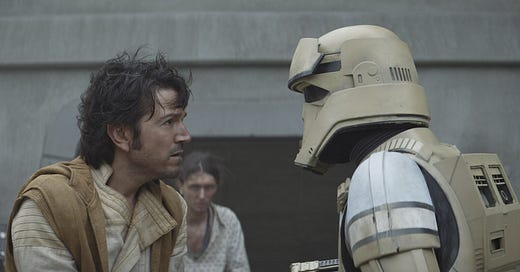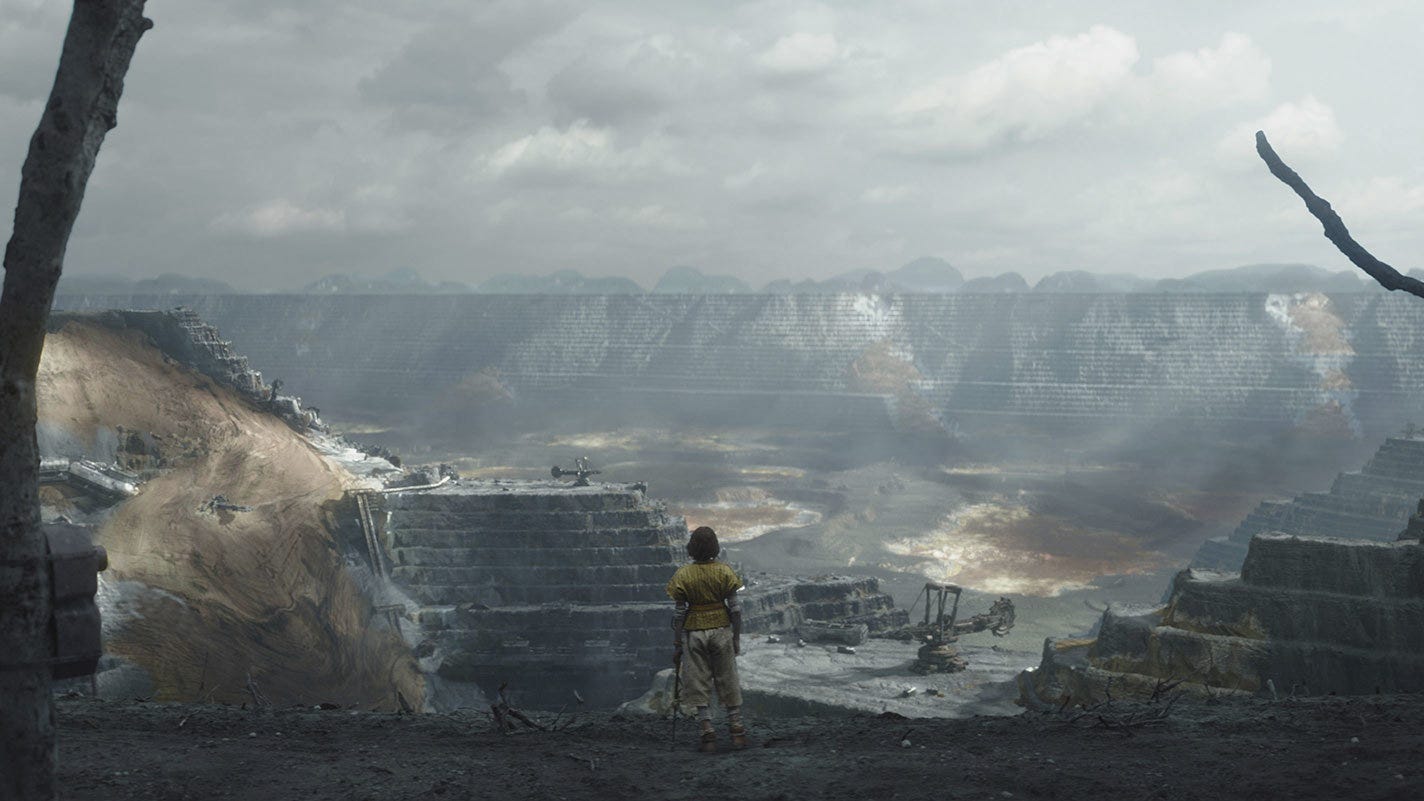Don't You Want to Fight These Bastards For Real?
Andor is one of the best pieces of political storytelling in modern television, and the best Star Wars story ever told.
An innocent man is mistakenly apprehended by the authorities and sent to a far away prison camp where no news gets in, and no one gets out.
A local community with strong bonds of kinship and cultural identity finds itself in the slowly tightening grip of colonial imperial control.
A loose collection of opposition forces, rudderless and weak, attempts to organize in the face of mounting fascism.
Undocumented laborers, vulnerable by their status but essential to the functioning of the State, are manipulated by administrators under the guise of law and order.
Mundane administrative actions employed to enforce centralized control create unforeseen backlash among governed populations.
Good guys do evil things, and normal people are rendered evil by the systems in which they participate.
This is not your typical Star Wars story. This is Andor.
From its its stunning visuals to its perfect casting choices to the brutally slow unfolding of its central drama, Andor is a masterclass in storytelling.
My favorite television show is back for its second and final season, and I'm begging you to watch it. Alongside Dune, Andor has become a growing obsession for me over the last three years.
Ever since I first watched that masterful first season back in late 2022, I knew exactly what this show was trying to say, and I was floored that it was allowed to say it with such clarity.
This is not exactly a review, but rather a recommendation. I cannot speak highly enough about this series. From its its stunning visuals to its perfect casting choices to the brutally slow unfolding of its central drama, Andor is a masterclass in storytelling.
And it is radical to its core. Andor offers a devastating commentary on our contemporary political climate, and provides and unlooked for hope regarding how we might improve it.
When Tony Gilroy gave us Rogue One in 2016, we ended up with arguably the best Star Wars standalone film ever made. Gilroy showed the world that it was possible to tell a serious, “adult” sci-fi story from inside that Galaxy Far, Far Way. With Andor, he merely uses this Galaxy as a backdrop to tell an excruciatingly relevant story about colonialism, oppression, fascism, and revolt.
Gilroy offers searing critiques of Liberal complicity with fascist overreach, Leftist infighting and disorganization, and the banality of evil.
His indictment is so complete, so ruthlessly precise, that the only real mystery is how the cretins at the Walt Disney Corporation ever let him get away with it.
The Revolution Will Be Televised
At its heart, Andor is a show about radicalization. It understands, far more clearly than most prestige television, how people are broken, bought, and ultimately, built into revolutionaries.
It also truly understands how fascism operates. It spreads throughout the Galaxy not primarily through grand ideological theater, as we have seen in previous iterations, but through small, grinding humiliations. It weaves a web of surveillance, austerity, and everyday cruelty that slowly entraps both its victims and its perpetrators.
In keeping with this theme, there are no Jedi in Andor.
No lightsabers, no monologues about the Force, no operatic standoffs between overpowered space wizards.
The villains are bureaucrats and Yes Men.
The heroes are petty thieves, burnt-out idealists, frightened lovers, and radicalized bureaucrats.
At its heart, Andor is a show about radicalization. It understands, far more clearly than most prestige television, how people are broken, bought, and ultimately, built into revolutionaries.
Andor is less interested in epic contests between cartoonishly rendered abstractions of good and evil and more interested in showing how power masks itself in procedural bureaucracy.
It demonstrates how violence disguises itself as “law and order,” and how the machinery of empire is greased not by terror alone, but also by the silence of good people, and the petty ambitions of sad little men, desperate for significance.
Star Wars has always been explicitly political. George Lucas has been vocal about how the original inspiration for the Galactic Rebellion was the Viet Cong, and the Empire was an amalgam of American militarism, the British Empire, and the Third Reich. That's why the Galactic Imperial officers all dress like Nazis and talk like British colonial administrators.
Andor shows the costs, the betrayals, the sacrifices, and the compromises that must be made in order to truly mount a challenge to creeping fascism.
Since its acquisition by Disney, the political edge of Star Wars has been blunted somewhat in favor of corporate identity play and generic appeals to abstract notions of hope and solidarity. The last decade of Disney Star Wars was made of the same out-of-touch Resistance Lib slop that is largely responsible for why every demographic except for rich fucking white people in Palo Alto has turned on the Democratic Party.
And then, there's Andor.
Slow, uncompromising, unheroic, devastating, revolutionary.
Within the Star Wars universe, it stands in a class of its own in terms of quality, depth and moral clarity. I would argue that it is the greatest Star Wars story ever told, including the fan favorite The Empire Strikes Back
The show is very much a slow burn, and that is its greatest strength. It does not dampen the long arc of radicalization with cheap demonstrations of easy heroism. Nobody in this show starts as a radical.
They become radicalized by the material conditions of their lived realities.
"The pace of repression outstrips our ability to understand it. And that is the real trick of the Imperial thought machine" says Karis Nemik, the show's equivalent of a young Leon Trotsky, or perhaps Abdullah Öcalan. "It’s easier to hide behind 40 atrocities than a single incident.”
Andor shows the costs, the betrayals, the sacrifices, and the compromises that must be made in order to truly mount a challenge to creeping fascism. Every major character is trapped in a system that diminishes their liberty, whether they recognize it yet or not.
When they finally do, Andor gives them no easy path forward. It leaves them with a single choice: join the Empire, or fight it.
Nobody in Andor starts as a radical. They become radicalized by the material conditions of their lived realities.
A New Hope?
The most uplifting aspect of Andor is the unlikely optimism it instils in the viewer when they remember that this dark, brutal story is the *prequel* to the one that saves the Galaxy.
We find our main characters facing truly insurmountable odds, only to remember that we already know the end of their story.
It ends with Luke Skywalker facing down his own father, defeating the Emperor, and blowing up the imperial super weapon innocently named the 'Death Star.'
If that is a spoiler, sorry. It's been like… fifty years?
Andor is about a group of unlikely heroes forced to make desperate decisions to challenge a fascist empire that seems impossibly strong. But while we do not yet know how things will end up for most of the characters, we do understand that this string of sacrifices, these small acts of defiance ultimately do bring down the hegemony of the Galactic Empire.
In Andor, this fascist Empire is approaching the apogee of its power. But even at its strongest point, it is still vulnerable.
This vulnerability stems from its own oppressive nature and desire for totalitarian control. "Power doesn't panic" remarks Cassian Andor, the shows titular character, at a pivotal moment in the first season's best episode.
It is a dramatic call to imagination, outrage, and action.
In Gilroy's mind, this Empire is simply a metaphor for growing fascism. The seeds of its inevitable downfall are referenced throughout the show, usually through the ideological rumination of Karis Nemik, who serves as the show's political mouthpiece.
"The Imperial need for control is so desperate because it is so unnatural" writes Nemik. "Tyranny requires constant effort. It breaks, it leaks. Authority is brittle. Oppression is the mask of fear."
The audience is implicitly trusted to understand what this means in the real world, and what might be expected of them if they were to find themselves in a similar situation. (Again, how many people at Disney had to sign off on this thing??)
Andor refuses mythic heroism in favor of something more real, and therefore more inspiring. It is a dramatic call to imagination, outrage, and action. Gilroy trusts you to understand the stakes of inaction in the face of fascism, and the costs of action. He trusts you to recognize how power works, and what it will mean for you to challenge it. He also gives you a reasonable hope that you might be able to win.
After all, rebellions are built on hope.
Fascism, on the other hand, thrives on fear.
It narrows your dreams, corrupts your friends and your family. It mocks empathy and dreads compassion.
It reduces you to a cog, a cell, an insect whose only purpose is to fan the flames of rage and fear or be consumed by them. It bastardizes all bonds of solidarity and kinship to build a death cult of unity through strength and exclusion.
It is deeply inhuman, and this inhumanity is fully realized in Andor. The show drags you deep into the maw of fascist terror, and leaves you asking the question: "don't you want to fight these bastards for real?"
There will be times when the struggle seems impossible. I know this already. Alone, unsure, dwarfed by the scale of the enemy. Remember this. Freedom is a pure idea. It occurs spontaneously and without instruction. Random acts of insurrection are occurring constantly throughout the galaxy. There are whole armies, battalions that have no idea that they've already enlisted in the cause. Remember that the frontier of the Rebellion is everywhere. And even the smallest act of insurrection pushes our lines forward. And then remember this. The Imperial need for control is so desperate because it is so unnatural. Tyranny requires constant effort. It breaks, it leaks. Authority is brittle. Oppression is the mask of fear. Remember that. And know this, the day will come when all these skirmishes and battles, these moments of defiance will have flooded the banks of the Empire's authority and then there will be one too many. One single thing will break the siege. Remember this. Try.
– Excerpt from the Untitled Manifesto of Karis Nemik










I'm old enough to have seen the original Star Wars 7 times in the theater when it first debuted and have been a fan ever since. My younger brother has been insisting I watch Andor. You gave me the push I needed. Thanks!
Dang this was incredibly well-written and inspiring article. I’m actually going to go watch the show now. Not gonna pay Disney for it though 😄